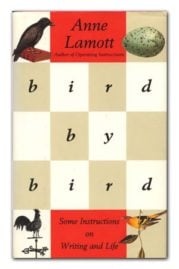How to Stop Procrastinating and Start Writing — Tips & Strategies
By Nava Atlas | On February 14, 2018 | Updated July 27, 2024 | Comments (0)

What is it about writers and procrastination? Here we’ll look at some tips from writers past and present to help you stop procrastinating and start writing — or delve into a long-delayed project.
We’ll also take a look at the reasons why procrastination can loom large when taking pen to paper, or more likely, fingers to the keyboard.
Does any of the following sound familiar?
- You don’t have enough time today — maybe tomorrow.
- You’re too distracted, so you talk yourself out of doing any writing or other kind of creative work at all.
- It’s just not the right time in your life.
- You’re waiting for inspiration to magically drop into your brain.
- Why torture yourself today when you can put whatever it is off until tomorrow, or next month, or next year?
- You need to do errands, shop for groceries, clean, prepare meals, and generally put everyone else’s needs before your own.
Getting that crappy first draft down on paper
You want whatever you’re writing to come out perfectly, or near-perfectly, on the first draft. Now come on, you know that rarely, if ever happens.
That’s why Anne Lamott, author of the classic manual for writers, Bird By Bird: Some Instructions on Writing and Life, encourages writers to begin with what she has famously called “Shitty first drafts.” Get the thoughts out, no matter how rough. Perfectionism is the partner to procrastination.
You convince yourself that your habit of procrastination is an outcome of your lack of self-discipline. But self-discipline is like a muscle that can be strengthened.
Madeleine L’Engle, the prolific author best known for A Wrinkle in Time wrote:“Ultimately, you have to sit down and start to write. And even if all you do is type out ‘I can’t write this morning; I can’t write this morning; oh, bother, I can’t write this morning,’ that will sometimes prime the pump and get it started.”
. . . . . . . . . .
. . . . . . . . . .
All writers & creatives procrastinate!
In Seducing the Demon: Writing for My Life, Erica Jong has an interesting theory many of us can relate to: “We are so scared of being judged that we look for every excuse to procrastinate.”
Procrastination isn’t a modern phenomenon when it comes to writers. Though it’s hard to believe that the French author George Sand (1804 – 1876) ever procrastinated — she wrote more than seventy novels and countless other works in multiple genres — apparently, she did. In an 1869 letter to a friend, she wrote:
“While you are running around to get material for your novel, I am inventing all sorts of pretexts not to write mine. I let myself be distracted by guilty fancies, something I am reading fascinates me and I set myself to scribbling on paper that will be left in my desk and bring me no return.
That has amused me, or rather that has compelled me, for it would be in vain for me to struggle against these caprices; they interrupt me and force me …”
It’s hard to quantify whether it’s more difficult to be disciplined in this day and age when there are infinite ways to procrastinate than it was one or two hundred years ago.
If inclined to dawdle, a literary woman in the 19th century could just as easily have found a myriad of reasons to put off writing from one day (or decade) to the next. There were chickens to be plucked, babies to be swaddled, and infirm elderly parents to attend to.
Following are more views on the causes of procrastination, and tips for how to stop procrastinating and start writing:
. . . . . . . . . .

. . . . . . . . . .
Don’t set yourself up for failure
Why Writers are the Worst Procrastinators explores the psychological origins when it comes to procrastination in in the case of writers. Why writers are the worst procrastinators. In this Atlantic article by Megan McArdle, she argues for the notion that: “Forced into a challenge we’re not prepared for, we often engage ‘self-handicapping’: deliberately doing things that set us up for failure.”
. . . . . . . . . .
. . . . . . . . . .
Fight fear in all its forms
On the Simple Writing blog, Stop Procrastinating With Your Writing explores five reasons why you’re procrastinating, starting with the number one roadblock — fear:
“Fear of failure, success, exposure, rejection, humiliation … writers experience so many different kinds of fear. Add other emotions like frustration, impatience, shame, and dejection and you’re scratching the surface of a writer’s inner life.”
More than just understanding the reasons for procrastination, the post linked to above gives you strategies for overcoming it.
. . . . . . . . . .

. . . . . . . . . .
Recognize that you’re not being lazy
Written from a more academic perspective, in a post simply titled Procrastination, the Writing Center of UNC at Chapel Hill helps you understand why you procrastinate, and emphasizes that you’re not alone:
“If you think you are a hopeless procrastinator, take heart! No one is beyond help. The fact that you procrastinate does not mean that you are inherently lazy or inefficient.”
Once you can drill down on the origins on your procrastination habit, this post gives you lots of tips on taming the beast.
. . . . . . . . . .
. . . . . . . . . .
“The secret of getting ahead is getting started”
Write to Done delves into actual studies in This New Research Helps You to Stop Procrastinating and Start Writing. “Just do it,” the phrase popularized by Nike can really throw you off course, but “Just get started” might be the key.
Agatha Christie is often credited for having said (although she probably didn’t), “The secret of getting ahead is getting started.” See more of the Queen of Crime’s writing tips.
. . . . . . . . . .
Might procrastination be part of the writing process?
Craft your Content give a refreshing take on procrastination, musing on How Procrastination is Actually Part of Your Writing Process:
“When you’re in tune with your own writing process, you understand how procrastinating can actually be a part of your process, just as much as brainstorming, outlining, drafting, revising, and proofreading are all steps in the writing process.”
How refreshing! It sure takes the guilt trip out of it, and sometimes, looking at a habit in a new light can make all the difference.



Leave a Reply